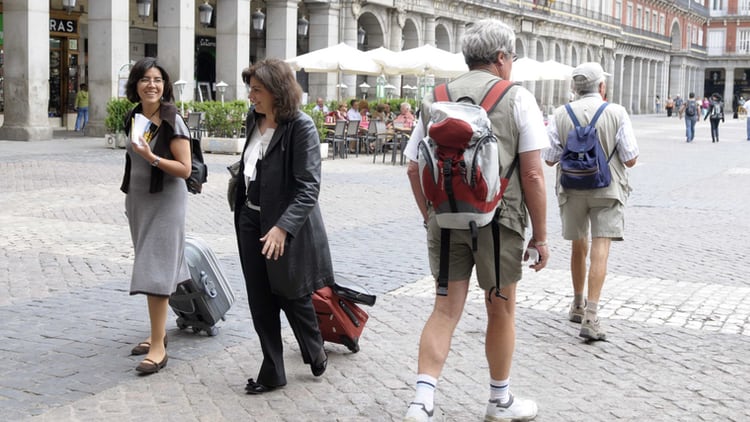The Diplomat
The long weekend of the Constitution and the Immaculate Conception bank holiday reached historic figures for international tourism in Madrid for these dates. In addition, the arrival of Spanish and foreign visitors generated an estimated total expenditure of 365 million euros in the capital, a figure that represents a decrease of 10% compared to the week before the long weekend, but an increase of 13.1% compared to the previous year.
This is according to the report drawn up by the Madrid City Council’s Directorate General for the Economy based on information from bank transactions. During the week of the long weekend, from 4 to 10 December, the average ticket amounted to 26.4 euros, following a similar line to that of the week prior to it, reports Europa Press.
However, compared to last year, the average ticket was 3.1% lower. In terms of consumption, both the week of the long weekend and the week before it were similar, with an increase in spending on Friday and Saturday and a decrease on Sunday, except in the week of the long weekend, when spending also fell on Wednesday due to the public holiday.
While Madrid saw a large influx of tourists during the long weekend, locals left the capital, which was reflected in consumption, with spending by visitors from the rest of Spain increasing by 6.5%, to the detriment of spending by locals, which fell by 13.6% in the capital. Spending by foreigners also fell by 19.3%.
However, compared to the previous year, there was an increase in expenditure, with domestic tourists spending up by 30.8% and foreign tourists by 31.2%.
In the week prior to the long weekend, the greatest weight of spending was by both domestic and foreign tourists with 27.9% and 30.5%, respectively. Compared to the same week in 2022, there was a slight increase in the proportion of domestic and foreign expenditure, from 26.4% to 30.5%.
Accommodation, catering and fashion
Compared to the previous week, spending during the public holidays decreased in almost all categories except those related to the tourism sector such as accommodation (8.6%), catering (2.9%) and fashion, footwear and accessories (2.6%). The biggest decreases were in health services (-39.6%), personal care (-34.4%) and automotive (-46.3%), as these services are more related to residents and not tourism.
Compared with the long weekend of the previous year, spending grew in almost all categories, with the most considerable increase in those related to tourist consumption such as tourist accommodation (25.7%), restaurants (14.7%), transport (61.9%) and leisure, shows and culture (24.6%).
As for the average ticket, the fall in almost all categories is noteworthy, except for those most directly related to tourism, with an increase in accommodation (21%), restaurants (14.3%) and transport (7.3%). Likewise, with respect to the previous year, the ticket with the highest increase was in transport (20.9%) and tourist accommodation (11.4%).
International tourism figures
The deputy mayoress and spokesperson for the municipal government, Inma Sanz, yesterday highlighted the international tourism figures recorded over the long weekend of the Constitution, with “historic” numbers of visitors. “It has been an extraordinary long weekend. The pre-pandemic figures have been recovered, 365 million euros, 13% more in terms of spending than in the same week last year. We didn’t need to wait for the study to know that it had been a historic long weekend in that sense, but now the figures also confirm it,” he said in statements to journalists from Ifema Madrid, after the study carried out by the City Council based on data from credit card transactions.
Sanz considers that the long weekend is consolidating itself as the time when most national tourists come to Madrid, but with an increase in international visitors as well. “There were times when international tourists did not come to Madrid as much, but now they are coming at all times of the year,” he said.
He also stressed that although many Madrileños take the opportunity to travel to other regions of Spain, there are also “more who stay” in the city. “These are very significant figures. They have to do above all with spending related to leisure, shopping, cultural activities and, therefore, once again reflect the fact that Madrid is a fashionable city”, the Deputy Mayor stressed.







